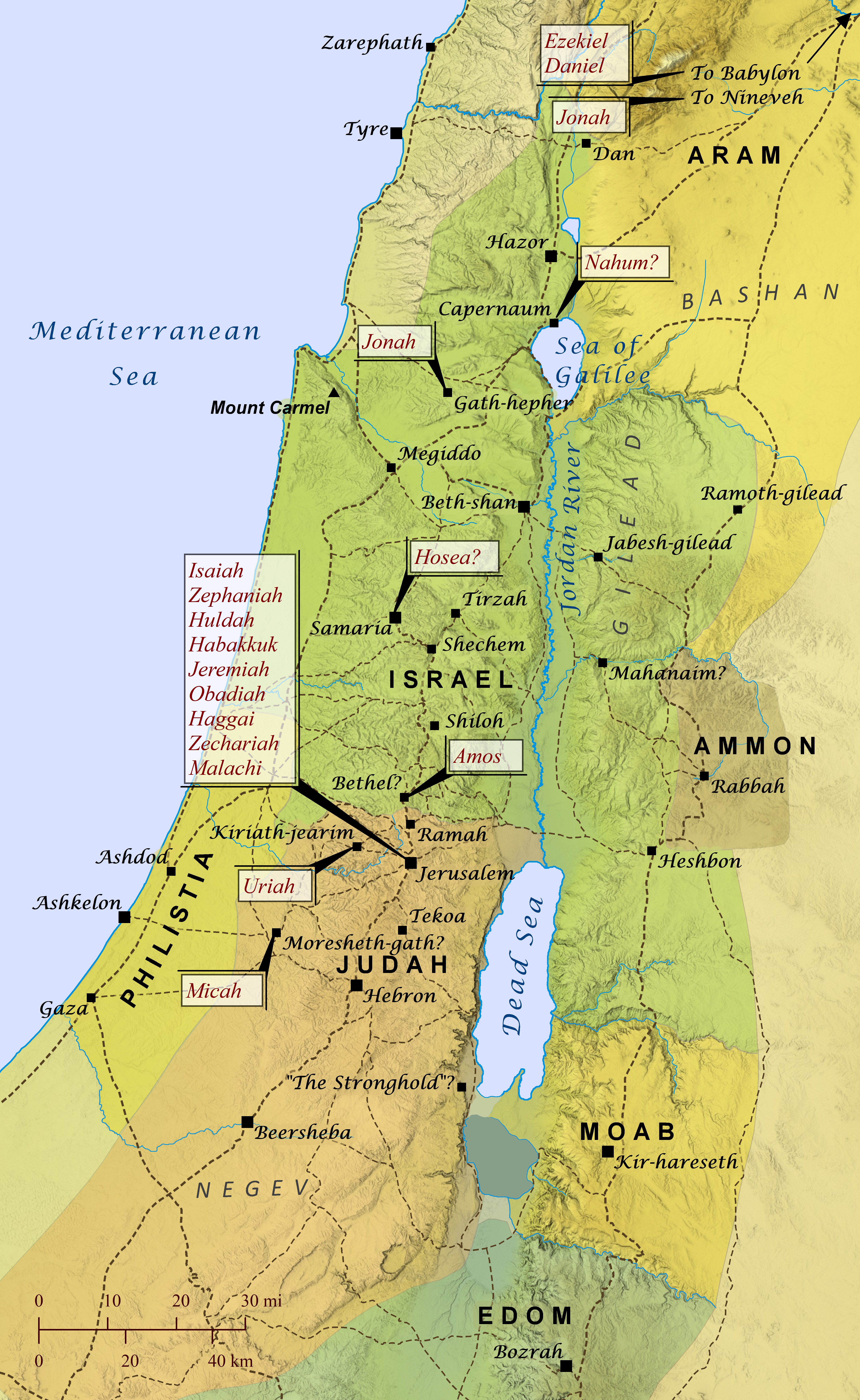Readers’ Version
Literal Version
1 This is Yahweh’s message that came to Micah (from Moreshet) in the days of Yehudah’s (Judah’s) kings Yotam (Jotham), Ahaz, and Hizkiyah (Hezekiah), that he saw concerning Shomron (Samaria) and Yerushalem (Jerusalem).[ref]
≈ Let the world and everything in it pay attention.
Let my master Yahweh be against you as a witness,
my master from his sacred temple
3 because wow, Yahweh comes out of his place.
He will come down and tread on the high places[fn] of the earth.
4 The mountains will melt under him.
≈ The valleys will break apart,
like wax that’s near a fire,
≈ like waters that are poured out from a steep place.
5 All that is because of Yakob’s (Jacob’s) disobedience,
and because of the sins of the Israeli people.
What was Yakob’s transgression? Isn’t it Shomron?
What is Yehudah’s (Judah’s) high place? Isn’t it Yerushalem?
6 “I will make Shomron a heap of ruins in the countryside—
≈ a place for planting vineyards.
Then I’ll pour the stones from her buildings down into the valley
≈ and I’ll uncover her foundations.
7 All her carved statues will be smashed into pieces,
and all her wages will be burnt.
Yes, I’ll totally destroy all her idols.
Since she used prostitutes’ wages to pay for them,
≈ the crushed pieces of idols will become prostitutes’ wages again.”
8 Because of that, I’ll mourn and wail.
I’ll go barefoot and undressed.
I’ll wail like the jackals
≈ and mourn like owls
10 Don’t tell about it in Gat.
Don’t weep at all.
I roll myself in the dust at Beyt-Leafrah (the house of dust).
11 Pass by undressed and humiliated, inhabitants of Shafir.
≈ Don’t come out, inhabitants of Tsa’anan.
Beyt-Haetsel mourns—its place to stand is taken from you
12 because the inhabitants of Marot wait anxiously for good,
because disaster has come down from Yahweh to Yerushalem’s gates.
13 Harness the chariot to the team of horses, inhabitants of Lakish.
She was the beginning of sin for the daughter of Tsiyyon (Zion),
because Yisrael’s transgressions were first found in you.
14 So you’ll give parting gifts to Moreshet-Gat.
The town of Akzib will deceive Yisrael’s kings.
15 I will again bring a conqueror to you, inhabitants of Mareshah.
Yisrael’s best will come to Adullam.
16 Shave your head
≈ and cut off your hair
for the children who you delight in.
Make yourselves as bald as eagles,
because they’ll be taken from you and into exile.
1:3 Possibly referring to the pagan temples which were often constructed on hilltops.
2 Hear Oh_peoples all_of_them pay_attention Oh_earth and_all_that_is_in_of_it and_let_it_be my_master YHWH in/on/at/with_you(pl) as_witness my_master from_temple_of holy_of_his.
3 If/because here YHWH is_about_to_go_forth from_place_of_his and_come_down and_tread on the_high_places_of[fn] the_earth.
4 And_melt the_mountains under_him and_the_valleys they_will_be_cleft like_the_wax from_face/in_front_of the_fire like_water poured_out in/on/at/with_steep_place.
5 In/on/at/with_rebellion_of Yaˊₐqoⱱ/(Jacob) all_of this and_in/on/at/with_sins_of the_house_of Yisrāʼēl/(Israel) who is_the_transgression_of Yaˊₐqoⱱ am_not is_it_Shomrōn and_what are_the_high_places_of Yəhūdāh am_not is_it_Yərūshālam/(Jerusalem).
6 And_make Shomrōn as_heap_of_rubble_of the_field into_place_for_planting_of a_vineyard and_pour_down into_the_valley stones_of_her and_foundations_of_her I_will_uncover.
7 And_all idols_of_her they_will_be_crushed and_all wages_of_her they_will_be_burned in/on/at/with_fire and_all idols_of_her I_will_make a_waste if/because from_wages_of a_prostitute it_gathered_them and_unto the_hire_of a_prostitute they_will_return.
8 On this I_will_lament and_wail I_will_go barefoot[fn] and_naked I_will_make a_lament like_the_jackals and_mourning like_daughters_of an_ostrich.
9 If/because is_incurable wound_of_her if/because it_has_come to Yəhūdāh/(Judah) it_has_reached to the_gate_of people_of_my to Yərūshālam/(Jerusalem).
10 In/on/at/with_Gath do_not tell at_all_(weep) do_not weep in_house_of leaphrah dust roll_yourself[fn].
11 Pass_on to/for_you(pl) Oh_inhabitant[s]_of Shaphir bareness shame not she_came_forth of_Tsaʼₐnān/(Zaanan) the_inhabitant[s]_of the_lament_of Bēyt Ezel it_will_take from_you(pl) support_of_its.
12 If/because she_is_in_anguish for_good the_inhabitant[s]_of Mārōt if/because it_has_come_down calamity from_with YHWH to_gate_of Yərūshālam/(Jerusalem).
13 Harness the_chariot to_the_team_of_horses Oh_inhabitant[s]_of Lākīsh was_the_beginning_of sin it to_daughter_of Tsiyyōn/(Zion) if/because in/on/at/with_you the_transgressions_of they_were_found of_Yisrāʼēl/(Israel).
14 For_so/thus/hence you_will_give parting_gifts to Moresheth Gath the_houses_of ʼAkzīⱱ to_deception to_kings_of Yisrāʼēl/(Israel).
15 Again the_conqueror I_will_bring to/for_you(fs) Oh_inhabitant[s]_of Marʼēshāh to ˊAdullām[fn][fn][fn] the_glory_of he_will_come of_Yisrāʼēl/(Israel).
16 Make_bald and_cut_off on the_children_of delight_of_your make_large bald_of_yourselves as_as_the_eagle if/because they_will_go_into_exile from_you.
1:3 OSHB variant note: במותי: (x-qere) ’בָּ֥מֳתֵי’: lemma_1116 morph_HNcfpc id_33Wkf בָּ֥מֳתֵי
1:8 OSHB variant note: שילל: (x-qere) ’שׁוֹלָ֖ל’: lemma_7758 n_1.0 morph_HAamsa id_33jQ8 שׁוֹלָ֖ל
1:10 OSHB variant note: התפלשתי: (x-qere) ’הִתְפַּלָּֽשִׁי’: lemma_6428 n_0 morph_HVtv2fs id_33aMT הִתְפַּלָּֽשִׁי
1:15 OSHB note: Marks a place where we agree with BHQ against BHS in reading L.
1:15 OSHB note: Marks an anomalous form.
1:15 OSHB note: We read punctuation in L differently from BHS.

